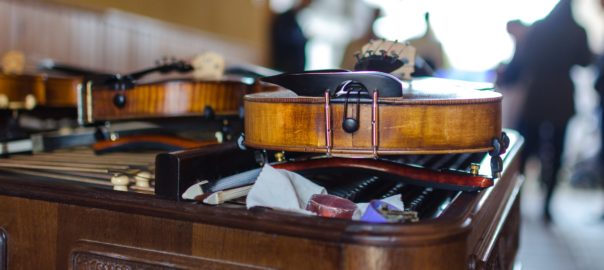A short reflection on experiencing the symphony.
I assume, there must have been music. That’s why people go to these symphonies after all. That’s what the word means after all, the Latin word symphonia “a unison of sounds, harmony” is chasing the tail of the Greek word symphonia “harmony, concord of sounds”. There must have been swelling violins and cheeky trumpets. And before that there must have been lutes and lyres. Harps. A swell of voices brought together in one place. Even poems, all in accord, all in harmony. In symphony.
Sitting in a small room on the left side of two story balcony, the stage to my left and the view of the main hall, where at least 200 more sit, to my right, and I could barely hear anything.
Not literally. The oboe tempered the air, the bass shook the ground under my feet, the jaunt and flirt of a melody woven up past my cheek, trembling in each inch of skin. High heels off, socked foot flat on the floor sending motion cascading through my toes, straight into my nervous system, causing even my head to nod in time. A waltz of body parts. A dip and curl of sounds.
But there must have been music then. And it did not resemble this.
My music now doesn’t resemble this. It doesn’t resemble it in its composition, even the wall of sound is a pale imitation of 15 violins playing purposely just off kilter until they come back stronger on kilter. And certainly my music doesn’t resemble this in its format. The way I experience music these days is through tiny tinny speakers. Through electronic monsters. Through automation. Music is a clash of 1s and 0s blinking on and off like a shudder, like a sigh, not an orchestra. Not a symphony.
Not even a concert is like this. A single guitar wailing. A mathematically accountable set of humans playing just the right instruments. A configuration dictated by the stars as much as by the Beatles. The usual line up: sexy bass players, heroic singer, rhythm guitar, percussion, and lead guitar is too stilted for whatever this is.
And yet, there must have been music then. Every day. Like hymns, like buskers, like voices filling up the streets of the centuries. Even when people came together to hear a symphony it was not like music now. Did people memorize them? Did they sing these complexities back to themselves when they were falling asleep? Sing the soft harp part to their children. Did they hum and wail at it like a folk song? Like a radio hit? Like a deep cut on an album you keep to yourself in your headphones, or like the top 40s of yesteryear in the background of your ears while you food shop, while you make out, while you stare aimlessly at the stop light in your car waiting for your turn?
What music came from the deep symphony? What music rolled through peoples minds? Was this the music that born a thousand lullabies? I doubt so. And yet…it came from somewhere.
I look around and the auditorium is just a building. Four walls. Six walls. 400 people walls. And this auditorium is mostly silent. Divided between people who hold their tickets and their information booklets close to their heart. Bodies draped in Sunday best. Locked inside a stone tower so tight not a single note escapes. And yet, how exciting it must have been back in the day. To stand in a place and witness, spontaneously, like fire from god itself, instruments coming to life. Belting music from thin air.
And yet.
There must have been music.
Because I do not imagine people without it. Because I do not imagine myself without music. The forms it took were probably seldom these. All erased. All destroyed. All more temporary than people who gather in a hall, people who drink champagne and laugh, people who come, one at a time, to sit and listen.
In this modern age, we do not come and listen either. We worry about the idleness of sitting to listen to music, the evilness of an unproductive nature. We recognize that this is all we can do while here so we avoid it. Instead of being active in our music, we experience it as a soundtrack instead. Headphones turning everything to a moving montage. Our eyes and ears working to make a symphony, a harmony of jarring inputs.
The music is mostly outside of us, music insular and isolating. Incidental. Disconnecting our lives but more deeply integrated into us. Directly into our ears.
Music remains the hymn, the lullaby, the idle hum that weaves syncopated rhythms while working. The stray notes of a stranger, the background of a moment, the over the top input in a dark bar that can shift an emotion in a second.
And so here I sit, with the music all around me. And I know, there is music here in this theater now, but there must have been music before, but it was probably nothing like this.
